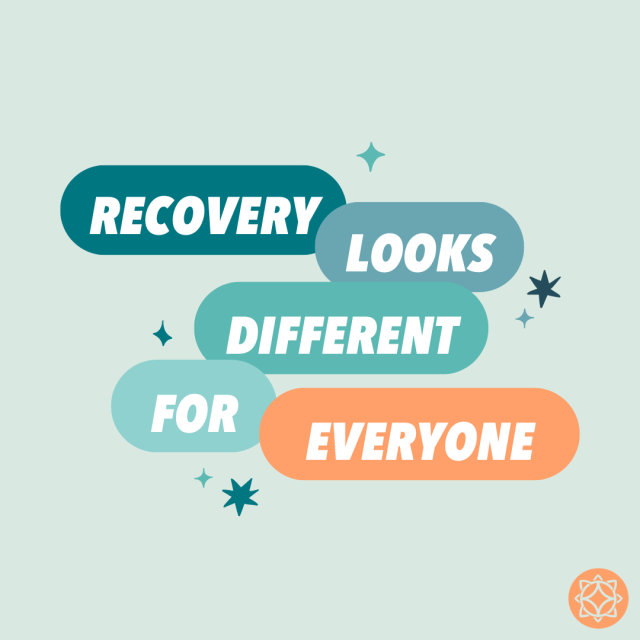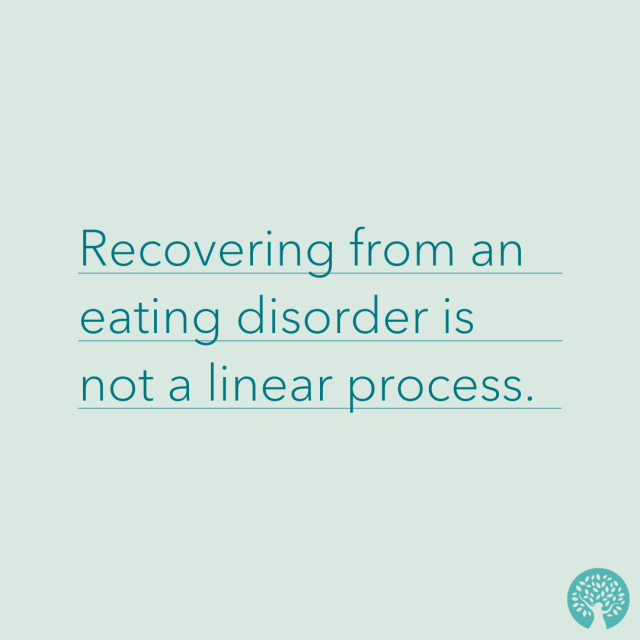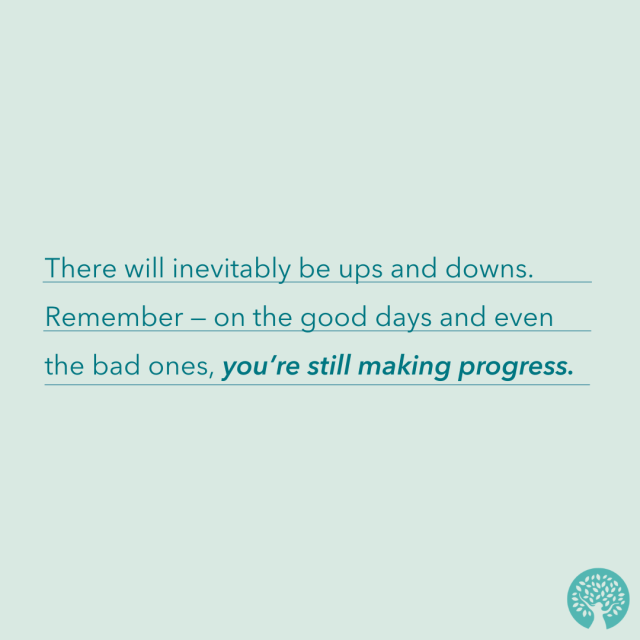Recovering from an eating disorder like anorexia, bulimia, ARFID and binge eating disorder is hard. It's important to remember that the discomfort you are experiencing now is temporary. If you are struggling right now, please remind yourself: “This too shall pass.”
Over time, the pain and discomfort you are experiencing right now will lessen and will be easier to manage. One day, the challenges you face now won’t look so impossible. Through it all, we hope to help you cope with the daily challenges in recovery with these 40 eating disorder recovery tips.

Tips to help you choose recovery every single day
- Feel like giving up? Every day, you get to make a choice. It’s up to you to choose recovery.
- Eating disorder recovery does not happen in a straight line. There will be ups and downs. On the good days and on the bad days, you are still making progress — as long as you continue to choose recovery.
- Remind yourself why you chose recovery. What led you to treatment in the first place? When you feel like giving up, write out a list of your values and your desires for your future — and let those guide you in taking the next best step for you.
- It’s okay to have difficult and painful thoughts, feelings and emotions in recovery. It’s okay to struggle. You may not know how you are going to get through this, but you will.
Tips for nutrition support
- Eating disorders aren't just about food — and you can't recover from an eating disorder without food. In recovery, food is your medicine. Without it, your brain and body cannot heal from the damage the eating disorder has caused.
- You deserve to have a peaceful relationship with food and your body. Remember that all foods fit in recovery.
- Mealtime can be difficult and you may be challenged. By approaching food in a balanced way, you can move forwards towards a lasting recovery. Reach out to your treatment team if you need help with meal planning.
- Remember that nutrition can resolve many physical and mental health consequences the eating disorder has caused. Nutrition can help with:
- Hormone balance
- Improving bone health
- Increasing energy
- Stabilizing moods (reducing depression, anxiety, irritability)
- Improving hair and skin health
- Our goal is to provide you with the resources you need to support your nutrition in recovery.
Tips to support eating disorder relapse
- Fact: you are going to be triggered in recovery. Stress is going to happen and it may happen a lot. You may be tempted to numb uncomfortable feelings by binge eating, purging, or using drugs or alcohol. However, it is extremely valuable to be able to feel your feelings without numbing them, without putting any barriers between you and your feelings. Reach out to your treatment team if this is hard for you.
- It’s common to experience shame in recovery when you slip into eating disorder thoughts and behaviors. Even in these moments, you have a choice to continue to choose recovery. If you are having urges that might lead you back into anorexia or bulimia relapse, try these steps.
- Stop and notice how you are feeling.
- Ask yourself: what is going on? Are you stressed? Have you gone through a major life change?
- Breathe and remind yourself that you have a choice in this moment.
- If you are feeling shame, call shame by its name. And let it go.
- If you do relapse, please know that you haven’t ruined everything. Be gentle with yourself. Relapse can offer us a teaching moment to become more deeply in tune with ourselves. If you fall, just get up, brush yourself off and keep moving forward in recovery.
- Life will throw you off balance. Illness, stress, and daily life changes can affect your hunger and your ability to make and eat foods. In recovery, there will be successes and there will be setbacks. Setbacks do tend to make us work a little harder in recovery and that’s okay.

Tips to help you feel connected
- When you feel like you are spiraling, remember that you are not alone. What can you do? Reach out for support! Contact us, call a crisis or support line (988), join a virtual eating disorder support group , see a doctor or mental health professional, or call a friend or family member. No matter how hard today feels, no matter how painful, remember this: You have access to the tools you need. Reach out.
- Stay up to date with your therapy, medical and dietitian appointments. This will be key in helping you stay connected and on the path to recovery.
- It’s very hard to get through recovery alone. Who can you go to when you need recovery support? Who can you text? Who can you call? Who can you see in person? Use your support team as often as you need to get through the tough moments that will continue to arise.
- Your support system should include individuals who are your “safe people.” Go ahead and write down a list of the people in your life who you feel safe with. Let this list remind you that you are not alone.
- Do you tend to isolate when times get tough? If so, you are far from alone. However, isolating yourself can increase feelings of self-loathing and shame. And isolating yourself might even lead to a relapse — which could make you feel even worse over time. Instead of withdrawing completely from everyone, try to keep in touch with a chosen few people daily. Make time to see them regularly, even if you choose to keep your visits short.
- Find community and connection by joining us at one of our free online eating disorder support groups here.
Tips to help you manage anxiety
- Facing your fears is hard! But it is a necessary process that takes us one step closer to achieving our dreams and thriving in recovery. In times of anxiety, can you step outside of yourself for a moment? Look around the room and refocus on the people around you. Reach out and connect with someone. When we shift the focus from fear to connection, we open ourselves up to joy and a deeper recovery.
- What are your go-to coping skills for anxiety? We recommend having some ideas lined up for moments you need them. Some examples:
- Calling or texting a supportive friend.
- Taking time to journal, meditate or enjoy a mindful walk.
- Whatever your personal recovery coping skills are, rely on them. Write them down. Memorize them. These will be your go-to problem solvers when you are struggling.
- Fact checking, a skill that comes from dialectical behavior therapy (DBT), can help you cope with anxiety. When an anxious thought arises, take a moment to clear your head.
- Identify the emotion. Ask yourself: what prompted this emotion?
- Look at the situation from another point of view.
- Ask yourself: is there a real threat? Is my anxiety really warranted?
Tips for social events and holidays
- If social events are hard for you in recovery, let someone know. Can you ask a trusted friend or relative to accompany you to parties or holiday gatherings? If they can’t go, ask if you can call or text them should you become anxious, upset or triggered.
- If you are going to a party and are not sure if you can stick to your meal plan, talk to your support team about creating an eating disorder relapse prevention plan to avoid being triggered or using eating disorder behaviors.
- As you become more aware of your emotions around food, holiday traditions and family dynamics, you may wonder how to get through holidays. Talk with your treatment team if you need help with the following:
- People commenting on your appearance or what you are eating (or not eating)
- Feeling tempted to stray from your meal plan
- Feeling self-conscious or anxious.
- Holidays can be hard, especially when you’re new to recovery. Take a moment to write down what you want your holidays to look like. How can your values guide your holiday season? Do you have any favorite holiday traditions? How does your recovery relate to each holiday? Own your power and redefine what holidays mean to you.
Tips to help you manage perfectionism
- Many who struggle with eating disorders like anorexia and bulimia also struggle with perfectionism. Remember: rigid rules and expectations only lead to more suffering, anxiety and shame.
- Life isn’t perfect. Don’t expect recovery to be. Recovery is being perfectly imperfect.
- In recovery we learn about the importance of flexibility. We learn how to let go of rigid expectations to find a world full of spontaneity, surprises and joy. If you tend toward being inflexible, try changing your daily routine or exploring new experiences (museums, hiking, social engagements, etc.)
Tips for self-care in recovery
- Acknowledge all your successes in recovery — even the small ones — by creating mini celebrations for yourself:
- Start a gratitude practice.
- Put your hands on your heart or give yourself a mini hug.
- Reward yourself with your favorite self-care.
- Remind yourself to breathe.
- If you talk to others in eating disorder recovery, the vast majority will tell you how hard recovery is. They will also tell you that you can do this. If you feel like you’re failing at recovery, please know that you are absolutely not failing. Life in recovery is hard! When you struggle, turn each situation around and ask yourself, “What do I need right now?” Give yourself a big dose of self-compassion and self-love and remind yourself that you can do this.
- Try using a mantra or repeating positive affirmations when needed: “I am right where I belong. It took all I’ve been through to get here. I am right where I need to be.”
- On hard days, it’s okay to take breaks. Make time for gentle movement, breathing exercises, body scans or other relaxation activities. Check in with yourself if you’re struggling; notice how you feel and determine what you need in that moment.
Mindfulness tips
- If you feel the urge to use eating disorder behaviors, take a pause. Can you allow those feelings and ideas to linger … without acting on them? Remind the eating disorder, “You can no longer bully me.” Meditation can help you strengthen your mindfulness muscles.
- You spent months or years numbing your pain by using eating disorder behaviors. As you make progress in recovery and difficult feelings start to surface, find healthier, more effective ways to cope with the pain: talk about what’s going on, journal or dance it out.
- Allow yourself to really feel your feelings — all of them. No, really! When we allow ourselves to feel our feelings without escaping, simply pausing and noticing, we get the opportunity to explore a new relationship with our feelings. Reach out to your therapist if this is hard for you.
- If you’re having a hard day, try urge surfing. This practice helps you ride the wave as you let the urge to engage in eating disorder behaviors pass. The goal of urge surfing is not to eliminate desires, urges or impulses. That task is impossible. The goal is to learn that not all desires, urges or impulses must be satisfied or responded to.
Tips to help you set boundaries
- If you find yourself saying "yes" too often — because you feel bad for saying "no" — know that it’s perfectly fine to set boundaries to protect yourself and your recovery. Setting boundaries can help to improve our self-esteem and increase joy as we start to prioritize activities in life that correspond to our highest values.
- If you think you’re saying “no” too much, or you are saying “no” because you just want to isolate, reach out to your therapist or a trusted friend to explore why. Discuss the difference between rest, self-care and isolating.
- Boundaries don’t ruin relationships. Boundaries help us preserve and maintain connections. This is because, with the right boundaries, both parties understand what the other needs. Both parties know how to keep the relationship healthy and harmonious. Instead of heading toward a rupture, with the right boundaries, relationships can strengthen and endure.
Read 14 tips from an eating disorder recovery advocate
We asked Sydney Fitzgibbons, eating disorder recovery advocate, what she has learned in her recovery, and she shared the following 14 tips with us.
Tip 1: Create a life you are excited to live.
It’s never too late to start doing the things you’ve always wanted to do. My relationship with food changed when it was a part of a life and connections that I cared deeply about keeping. Slowly but surely, I filled my time with so many things I wanted to do that there remained less and less unoccupied time in my day to focus on the eating disorder.
Tip 2: Tell your loved ones what you need.
It was so helpful for me when my family and friends reached out to schedule time to connect with me. I also had to hold myself accountable for reaching out to do this too. Between all of us, I didn’t have a ton of downtime, and quality time together was pivotal for me.
Tip 3: Give yourself grace.
In treatment, I learned what the voice of giving myself grace sounded like. This is the voice I recognize as my own today, after lots and LOTS of practice! In tough moments, when I was frustrated and being hard on myself, my eating disorder treatment team held compassion for me that I couldn’t find at the time. They reminded me that I was learning to live in a way I had never done before in such a raw manner. My favorite perspective question I learned in treatment is, “How can you expect yourself to be skilled at something you haven’t practiced yet?”
Tip 4: Be gentle and check in with yourself.
When I was dealing with eating disorder triggers in early recovery, I would slow down, change my environment to somewhere calmer and ask myself, “What do I need right now that I am using the eating disorder to fix/stop/numb?” Once I had the answer, I would try to meet that need in another way.
Tip 5: Be willing to have hard conversations.
In eating disorder recovery, communication can be difficult. Eating disorders exist and thrive in silence. And eating disorders can be used to regulate the nervous system. When you remove that crutch, you’re left with a lot of unmet needs that must be discussed and met. Recovery is impacted by your capacity to be honest and communicate your feelings.
Tip 6: Identify what is within your control.
If I was having an emotional reaction to a situation, I would ask myself what I could control in that situation. When it seemed like there was nothing that I could control, I would have to adjust my mindset or attitude. I would ask myself what I wanted to do about the things I could control and tried to take some action there. For things I couldn’t control, I got curious about what the learning opportunity was in the situation. Beyond that, I learned to see the things I couldn’t control as simply not worth my energy. I focused very intentionally on looking for the lesson in each situation, taking action when I could and accepting when I could not.
Tip 7: View life from a different perspective.
My treatment team helped me see things from the perspective of a healthy person. If I felt triggered to use eating disorder behaviors, they would help me pause, think about what unmet need I had or difficult emotion I was trying to avoid, and talk through it, as well as remind me that the eating disorder has continuously failed to give me what I needed long term.
Tip 8: Stay busy but stay balanced.
My eating disorder took up so much time and energy. In recovery, I became very intentional about using that energy and time to do things I cared about. I found that the less time I had unoccupied, the better off I was. I add the caveat to “stay balanced” because I was historically an over-giver, over-committer, etc. Learning to say “no” is one of the most powerful and self-loving tasks I have accomplished. I also did a lot of eating disorder therapy that helped me recover, untangling what I thought it meant about me when I said “no” to others, and that was very helpful.
Tip 9: Find an accountability partner.
My eating disorder treatment team helped me with accountability by providing many opportunities for conversations that were nonjudgmental, supportive, and met me where I was. Eating disorders are sneaky illnesses, so having a team looking out for ways that the eating disorder creeped in subtly avoided much worse relapses by addressing individual triggers and symptoms regularly.
Tip 10: Get clear on what you want and your “why” for recovery.
For many years, my attempts at eating disorder recovery were for other people, and my people-pleasing tendencies were not tied to my personal values. Even if, for example, your motivation for recovery is to be there for your friends both physically and emotionally, try to reframe it with a value you have, such as feeling connected and supportive. The more connected you are to your “why,” the more resilient you will be when things get tough.
Tip 11: Make serving others part of your life.
Humans are biologically hardwired to care about the well-being of other humans. Serving others can be part of your career or found in a volunteer role. When I started asking “How can I help?” and spent more of my time doing things that had nothing to do with me, I was able to build a self-worth I was proud of -- and I felt better doing it.
Tip 12: Get out in nature.
When facing eating disorder triggers, I found that working in the garden or taking a walk or a bike ride outside and blasting some music in my headphones significantly helped me move some of the energy of the triggers through my body.
Tip 13: Learn how to urge surf.
The concept of urge surfing helped me a ton in early recovery when urges felt like they would last forever if I didn’t act on them. In the video below, you can learn the basics of urge surging.
Watch: Urge Surfing Guided Meditation on YouTube
Tip 14: Know that eating disorder recovery is within reach.
What helped me in recovery the most was deciding to believe that life is happening for me, not to me. I say that I decided this, because no sky or sea parted; no one ever told me this. I decided to believe this because life is simply much easier when I do.
From treatment to the real world
When you enter an eating disorder treatment center, you’re given a safe, supportive place to heal. You’re nurtured by people who understand what you’re going through — professionals and peers. You learn how to talk openly about your feelings and struggles as you face challenges and learn new coping skills. You can rest when you need it. Whether you're in recovery for anorexia, bulimia, binge eating, or another eating disorder, treatment can feel like a cocoon … a place to safely recover. What a gift!
Inevitably, you must leave treatment and reenter the big, messy, unpredictable world. It is normal to feel overwhelmed by this transition, and to even resist it a little. But it is still a transition you must make. When you finish treatment, your world and day-to-day life are going to look and feel different.

Get matched with the support you need right now
Feel free to reach out to us if you need encouragement. We are here to help you maintain your recovery.
- Call 866-622-5914 now to speak with a compassionate, trained professional.
- Fill out this brief form to set up a free eating disorder screening.
Along with reaching out to us, we invite you to learn more about our alumni events and free online eating disorder support groups. As you create a life worth living, commit to recovery and know that we are right here to support you.
Thank you to our eating disorder recovery experts Eric Dorsa, Bonnie Brennan, Savannah Kerr, Robyn Cruze and so many others for contributing your wisdom and hearts to this piece.
These tips are reflective of individuals' lived experiences and are intended for informational purposes only. These tips are not intended to provide medical advice, nor are they a substitute for professional medical diagnosis or treatment.
Read more on eating disorder recovery:



